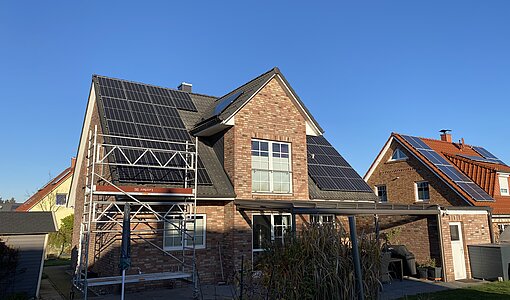2021. Another not normal year.
2021 was certainly a year of exceptions as well. Corona still has us in its grip, so I spent large parts of the year in the home office. Still, I'm in good spirits that we'll be able to translate this year's results reasonably well into the future.
Fun electric car.
One of the bigger investments in 2020 was the purchase of an electric vehicle. I mainly wanted to use it for my commute to and from work, taking the strain off the diesel. We sold our big station wagon and kept the modern diesel for holidays and longer trips and as a second car.
Since I was almost not in the office at all during the first six months, but worked from the home office, the e-car was available for all trips. So contrary to initial planning, my wife used this to drive to work on her part, we went shopping in it and actually did everything in it.
In the second half of the year, I was back in the office more and was able to use our MX-30 on what was supposed to be its intended route. The Mazda managed all these tasks without complaint and with flying colours, and in the whole year it happened exactly once that I had range anxiety - when I overslept in the morning and therefore drove to work quickly and without considering the battery, and on the way back a big traffic jam sent me on a rather wide bypass. That combined with temperatures around freezing brought the indicated remaining range and destination to be reached too close for my liking and I made a short 10min charge stop along the way. I suspect it would have been enough without the charge stop, but didn't really want to try that.
Then in early December I decided to take the e-car on a short business trip to Berlin as well - and that worked well too. The temperatures were low, again around freezing point - and you can tell that with the Mazda MX-30's rather small battery. With a recharge stop at a fast charging station en route and overnight recharging in Berlin, this adventure was also non-critical. I would certainly have been faster with the diesel on the trip, but it wasn't really problematic at any point.
Because we used the electric vehicle as a priority, our diesel stood unused in front of the house for a relatively long time. Especially in direct comparison, the combustion car, as practical as it may be, becomes like it's from the last millennium. I'm pretty sure we won't be buying another combustion car - if anything, maybe a hybrid - when the question of a successor for our second car eventually arises.
Interim conclusion after the first year: electric mobility is fun and there are few restrictions on long journeys. To be fair, we deliberately chose a model with a small battery; for someone who travels longer distances more often, there are certainly more suitable electric vehicles. Those who are interested should perhaps take a look at the Hyundai Ioniq 5, the Polestar 2 or the Skoda Enyaq iV. For people whose driving profile fits ours (about 130km per day commute total), however, the Mazda MX-30 we chose is a clear recommendation!
Photovoltaics
Our solar system has produced 8.94 MWh of electricity this year, which more than covers our needs, including the electric car. Due to the electricity storage we have a direct self-sufficiency of a little more than 66%.
Our electricity demand was higher than usual this year; probably because we were at home more often because of Corona and worked at home more often than usual; we also cooked more than usual. But because of the new electricity consumer in the garage, the electricity consumption is not directly comparable with the previous years anyway.
As an interim conclusion after the first year: we would make the purchase again and I advise anyone whose roof promises a successful harvest, to let it calculate once.
Nutrition
The long home office phases had the advantage here that we could cook more fresh. When shopping, we have paid a lot of attention to seasonal and regional produce, partly from the farm around the corner, but also enriched with our own harvest from the garden.
Of course, we also eat tropical fruits in the cold season; apart from that, we actually feel it is an improvement and not an abandonment to eat/buy fruits & vegetables that are just ripening at our place and don't have to be carted halfway across the continent.
Consumption
When it comes to consumption, we haven't really cut back much; I've given up a tech toy or two over the course of the year without missing it much a few weeks later. For the things we did buy, we paid attention to quality and longevity - as we have in the past. And to tell the truth: in the course of time we have accumulated a lot of things, so that we are not really without new acquisitions. On the contrary: we cleared out part of the attic and gave two carloads to an organization that redistributes them to those in need. They were especially happy about the baby and children's underwear - so if any of you still have a box or two of rompers lying around, maybe that would be an idea, too. :)
Public Emissions
Public emissions is the only category where we can't tweak anything directly. This is where the government's emissions are recorded and allocated to residents - e.g. administration, infrastructure, water supply, waste disposal, etc. Unfortunately, these emissions have increased compared to 2019, from 0.73 tonnes ofCO2 per resident to 0.86 tonnes. So for our household, that's 2.58 tonnes ofCO2 emissions.
Unsurprisingly, our budget has no impact on this position. Therefore, we have also hit the "planned" value here exactly.
Conclusion
So, our 3-person household generated about 9.41 tons of CO2 in 2021. This gives us a CO2 footprint per person of 3.13t per year.
The German average is 11.17t CO2 per person - something definitely needs to change. I am aware that our personal conditions are favourable: we have an energy-saving house, are relatively self-sufficient thanks to heat pumps and photovoltaics and can afford investments. My appeal: all those who also have these prerequisites should think carefully about doing the same and setting a good example. First and foremost, of course, to make a contribution to saving the climate. But all the measures in which we have invested are also likely to pay off in economic terms. The price of electricity, gas and petrol no longer causes a stir here.
But - and this is also part of the truth: the 3.13t per person and year in our household is still too much. The environmental organizations assume about 2t per person and year, which would still be climate compatible.
As announced at the beginning of our experiment, we want to become climate neutral in 2021 and will offset our carbon footprint at https://www.atmosfair.de/. Now that we have all the numbers together, I did this today and offset 11t of CO2 with a safety margin (PDF certificate, german only).
I am happy to announce that the experiment has succeeded and we have made our household climate neutral in 2021.
Challenge: Climate neutrality.
I want to significantly reduce my carbon footprint already in 2021 and become climate neutral in the future. If you want to join me on this adventure and are interested in my progress and thoughts, I will report about it on this page.
If you have any ideas or are facing a similar task, I would be very happy about your comment or message.






